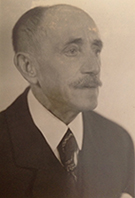Search for Names, Places and Biographies
Already layed Stumbling Stones
Suche
Moritz Kohl * 1877
Henriettenweg 5 (Eimsbüttel, Eimsbüttel)
HIER WOHNTE
MORITZ KOHL
JG. 1877
DEPORTIERT 1945
THERESIENSTADT
BEFREIT / KRANK ÜBERLEBT
TOT AN DEN SPÄTFOLGEN
Moritz Kohl, born on 13 July 1877 in Lemberg (today Lviv in Ukraine), deported to Theresienstadt on 14 Feb. 1945, died probably shortly after the liberation of the camp
Henriettenweg 5
Moritz David Friedrich Kohl was born on 13 July 1877 as the son of orthodox Jews in Lemberg/Galicia (today Lviv in Ukraine), which at the time belonged to Austria-Hungary. In 1882, the family moved to Vienna. There, Moritz Kohl attended the Bürgerschule [a secondary school for the middle classes] and then completed training as a textiles merchant. After passing the relevant exam, he went on his travels – as was usual at this time – which led him to the German Reich and eventually to Hamburg.
In Hamburg, he became acquainted with the Jerusalem Mission House on Eimsbütteler Strasse (today Budapester Strasse), where he was admitted into the house community and became a professing Christian. He was baptized on 25 Dec. 1903. Kohl found work as an installer of glass signs. On 7 Nov. 1904, he married Marie Louise Loose from Eickhorst near Minden, and the couple had four children. The family attended services at the Jerusalem Church on a regular basis. After the Nazi "seizure of power” (Machtergreifung), Moritz Kohl was forced to bear the additional name of "Israel.” However, he was spared any life-threatening persecution for the time being because he was married to an "Aryan” woman and had four children with her, consequently living in a "privileged mixed marriage” ("privilegierte Mischehe”) according to Nazi terminology.
If earlier, the Nazi state had deported only the Jewish spouses from dissolved (divorced) "mixed marriages,” toward the end of the "Third Reich” it also included those living in still existing "privileged mixed marriages” in the transports. Moritz’ oldest son Karl, who during the last years of the war had to perform forced labor in Hamburg in the Nazis’ "Todt Organization," a military engineering group, later wrote, "At the time when the war was already considered lost or had to be considered such, the Nazis abandoned their last scruples, if ever any existed at all, and in Feb. 1945 my father was deported to Theresienstadt, from where he was able to write only once, immediately upon his arrival.”
After the liberation of the concentration camp in May 1945, Moritz Kohl, who according to his son had literally lost his mind due to the political conditions even prior to his deportation, was taken back to Germany. Karl Kohl: "He went missing, however, on the transport during a stopover in Central Germany, and we never heard of him again.”
Translator: Erwin Fink
Kindly supported by the Hermann Reemtsma Stiftung, Hamburg.
Stand: April 2018
© Matthias Weber
Quellen: Schreiben von Karl Kohl über das Leben seines Vaters sowie Familienalbum von Annemarie Kohl, der Enkelin von Moritz Kohl; Beate Meyer, "Jüdische Mischlinge". Rassenpolitik und Verfolgungserfahrung 1933 –1945, Hamburg 1999, S. 266–275.


